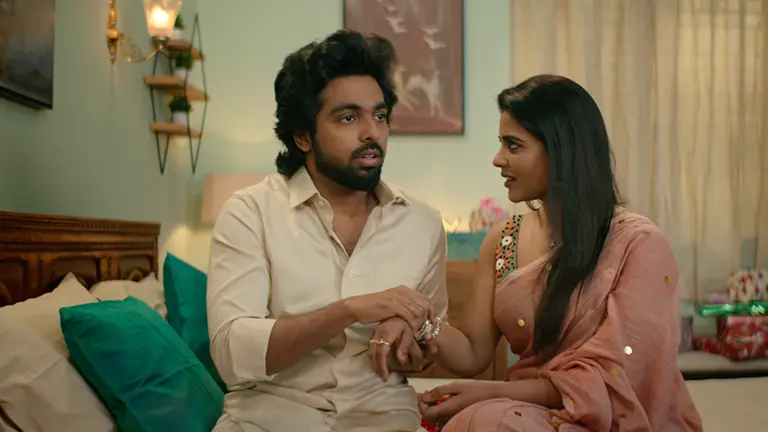Arjun cherishes his eight hours of sleep dearly. He happens to be a light sleeper, easily roused by the faintest of noises. Conversely, his wife, Deepika, assured him on their first night together that she is a deep sleeper. However, as fate would have it, he discovers her tendency to snore that very night, abruptly awakened by her nocturnal symphony.
Comparisons between “DeaAr” and “Good Night” are apparent with their core premise, the notable distinction being the gender reversal. Yet, Anand Ravichandran’s direction fails to leave a mark either as an independent film or as a companion piece.
If there’s one principle “DeAr” staunchly upholds, it’s the belief that ‘Time heals all wounds’. The film takes a rather irksome stance on marriage and divorce, suggesting, ‘So what if a man abandoned you and your children long ago? Why hold onto resentment? After all, he is human too, deserving of forgiveness.’
When the narrative takes a serious turn, particularly with the introduction of family honor, any hopes for the film’s success quickly unravel. “DeAr” adds to the list of recent films that disappoint with their handling of dramatic elements.
The potential of a talented actress like Aishwarya Rajesh is squandered in this film, largely due to her underdeveloped character. While ample time is spent fleshing out the character played by GV Prakash Kumar, Aishwarya’s Deepika remains distantly aloof from the audience. Despite initial promise, the film fails to delve into her inner thoughts and emotions.
A film addressing the challenges faced by a woman due to her snoring should treat its female characters with dignity and respect. Instead, “DeAr” opts for scenes laden with unsubtle jabs at feminism and feminists.
The film missed several opportunities for deeper exploration. When Arjun initially considers divorcing Deepika over her snoring, he discusses it with both a male and female friend. The male friend questions if women indeed snore, but the female friend provides perspective from Deepika’s side. This brief interaction highlights the importance of cross-gender friendships, yet such moments are sidelined in favor of a standard narrative.



